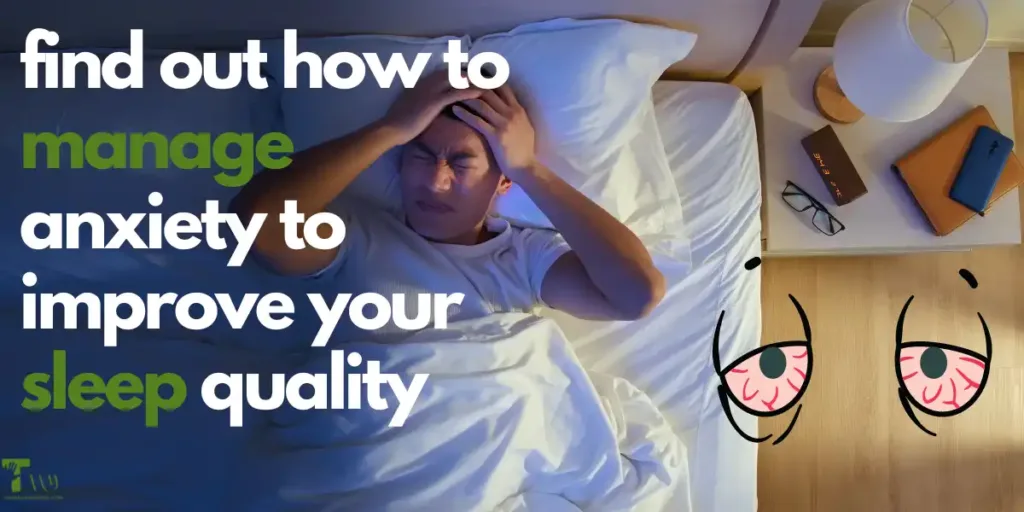Insomnia is a sleep condition that impacts millions of individuals worldwide. If you’re one of them, you know how frustrating it can be to toss and turn all night, unable to get the rest you need. While there are many factors that can contribute to insomnia, some causes are more common than others. In this article, we’ll explore the 5 most common causes of insomnia and provide tips on how to address them.
Cause #1: Stress and Anxiety
Stress and anxiety are the primary reasons behind insomnia. When you’re stressed, your body releases hormones that keep you alert and awake. If you’re dealing with anxiety, your mind may race with worry, making it difficult to fall asleep. Both stress and anxiety can lead to chronic insomnia if left untreated.
Thankfully, there are numerous methods for dealing with stress and anxiety. Deep breathing is a useful approach as it can decrease your heart rate and relax your thoughts. Meditation is another helpful tool that can reduce stress and promote relaxation. If your stress and anxiety are severe, you may want to consider talking to a healthcare provider about therapy or medication options.
Cause #2: Poor Sleep Habits
Poor sleep habits are another common cause of insomnia. If you don’t have a consistent sleep schedule, your body may not know when to fall asleep or wake up. Similarly, if you nap during the day or use electronics before bedtime, you may be disrupting your body’s natural sleep-wake cycle.
To improve your sleep habits, start by establishing a consistent sleep schedule. Attempt to establish a consistent sleep schedule by going to bed and waking up at the same time each day, including weekends. This can help regulate your body’s internal clock and enhance your sleep quality. You may also want to create a relaxing bedtime routine, such as taking a warm bath, reading a book, or practicing gentle stretches. Finally, it’s important to avoid electronics for at least an hour before bedtime, as the blue light can interfere with your body’s production of melatonin, a hormone that regulates sleep.
Cause #3: Medical Conditions
Certain medical conditions can also cause insomnia. If you’re dealing with chronic pain, sleep apnea, or restless leg syndrome, you may find it difficult to fall or stay asleep. Other conditions, such as acid reflux or an overactive thyroid, can also interfere with your sleep.
If you suspect that a medical condition is causing your insomnia, it’s important to talk to your healthcare provider. They can help you diagnose the underlying issue and recommend appropriate treatment options. This may involve altering your lifestyle, receiving therapy, or taking medication.
Cause #4: Medications
Insomnia can be a potential side effect of certain medications. For example, medications for high blood pressure, asthma, and depression can all interfere with your sleep. If you’re taking any medication and experiencing insomnia, it’s important to talk to your healthcare provider. They may be able to adjust your dosage or recommend alternative options.
Cause #5: Caffeine and Alcohol
Finally, caffeine and alcohol can both contribute to insomnia. Caffeine is a stimulant that can keep you awake, so it’s important to avoid it in the afternoon and evening. Alcohol, on the other hand, can disrupt your sleep cycle and make it difficult to stay asleep. While alcohol may initially make you feel drowsy, it can lead to fragmented sleep and awakenings throughout the night.
To avoid the effects of caffeine and alcohol on your sleep, it’s important to monitor your intake. Try to limit your caffeine consumption to the morning hours and avoid drinking alcohol within a few hours of bedtime. If you’re struggling with insomnia, it may be helpful to eliminate caffeine and alcohol from your diet altogether.
Conclusion
Insomnia can be a frustrating and debilitating condition, but it’s often treatable with simple lifestyle changes and medical interventions. By identifying the underlying cause of your insomnia and addressing it directly, you can improve the quality and quantity of your sleep. Whether you’re dealing with stress, poor sleep habits, a medical condition, medication side effects, or caffeine and alcohol consumption, there are steps you can take to improve your sleep as a result, you can feel more refreshed and revitalized every day.
FAQs
How much sleep do I need each night?
Typically, adults require 7-9 hours of sleep per night, although this can vary depending on the individual.
Can exercise help with insomnia?
Yes, regular exercise can promote better sleep by reducing stress and promoting relaxation.
What is sleep hygiene?
Sleep hygiene refers to the practices and habits that promote healthy sleep, such as maintaining a consistent sleep schedule and avoiding electronics before bedtime.
Can meditation really help with insomnia?
Yes, meditation can be an effective tool for reducing stress and promoting relaxation, which can improve the quality and quantity of your sleep.
When should I see a healthcare provider about my insomnia?
If you’re experiencing chronic insomnia or it’s impacting your daily life, it’s important to talk to a healthcare provider about potential treatment options.

